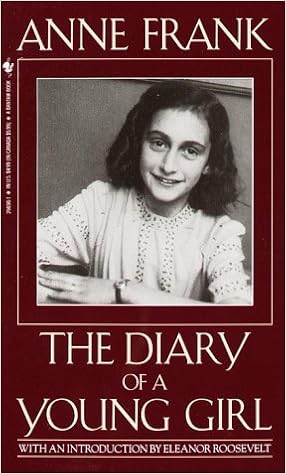I finished this book this weekend. It was an interesting read.... though at times, I was confused because I wasn't keeping track of all of the people that were coming to help them.
At times, the book got very mundane, but I understand why - in hiding, the only things that she could talk about were her relationships with people in the house, her fears every time they thought they might be discovered, and what they were eating. Between these entries, though, she was discovering her independence, and her self-awareness regarding happiness. Those parts were very inspiring.
She figuratively wrote to Peter, though she was just writing in her own diary:
"This morning, when I was sitting in front of the window and taking a long, deep look outside at God and nature, I was happy, just plain happy. Peter, as long as people feel that kind of happiness within themselves, the joy of nature, they'll always be able to recapture that happiness.
Riches, prestige, everything can be lost. But the happiness in your own heart can only be dimmed; it will always be there, as long as you live, to make you happy again.
Wherever you're feeling lonely or sad, try going to the loft on a beautiful day and looking outside. Not at the houses and the rooftops, but the sky. As long as you can look fearlessly at the sky, you'll know that you're pure within and will find happiness once more."
She also contemplates love, where she says:
"Love, what is love? I don't think you can really put it into words. Love is understanding someone, caring for him, sharing his joys and sorrows. This eventually includes physical love. You've shared something, given something away and received something in return, whether or not you're married, whether or not you have a baby. Losing your virtue doesn't matter, as long as you know that for as long as you live you'll have someone at your side who understands you, and who doesn't have to be shared with anyone else!"
And again, regarding happiness, she says:
"At such moments I don't think about all the misery, but about the beauty that still remains. This is where Mother and I differ greatly. Her advice in the face of melancholy is: "Think about all the suffering in the world and be thankful you're not part of it." My advice is: "Go outside, to the country, enjoy the sun and all nature has to offer. Go outside and try to recapture the happiness within yourself; think of all the beauty in yourself and in everything around you and be happy."
I don't think Mother's advice can be right, because what are you supposed to do if you become part of the suffering? You'd be completely lost. On the contrary, beauty remains, even in misfortune. If you just look for it, you discover more and more happiness and regain your balance. A person who's happy will make others happy; a person who has courage and faith will never die in misery!"
This third passage was interesting. On face values, it seems to go against the Dalai Lama's teaching that compassion is the key to happiness. I think her mom was not saying that she should feel compassion for the people that were being sent to the gas chambers; rather, her mom was saying just be glad you're not being sent to the gas chambers. Whereas Anne was saying that rather than counting her blessings for what she wasn't subjected to, she was counting her blessings for finding the beauty in the world.
I believe that her philosophy did follow what the Dalai Lama says - that happiness within will lead to happiness around you. Anne discovered this at such an early age, and given her close quarters to people she didn't get along with, the constant fear of being caught and sent to concentration camps, and her confinement in hiding and inability to grow up free, I'm inspired by her character and spirit.
Though the book was long and at times mundane, it inspires me in many ways.

No comments:
Post a Comment